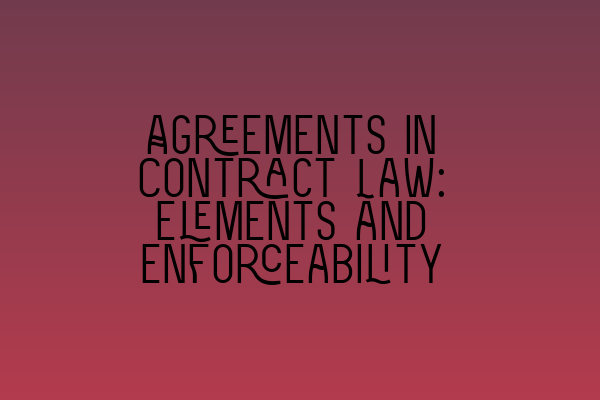Agreements in Contract Law: Elements and Enforceability
In the world of contract law, agreements form the foundation of legal relationships. Understanding the elements of a valid agreement and the factors that determine enforceability is crucial for solicitors and legal professionals. In this article, we will explore the essential components of an agreement and the key considerations when analyzing its enforceability.
Elements of an Agreement
An agreement, in contract law, is a mutual understanding between two or more parties that creates legal obligations. A valid agreement must possess certain essential elements:
- Offer and Acceptance: An offer is a proposal made by one party to another, expressing a willingness to enter into a contract. Acceptance is the expression of assent by the offeree to the terms of the offer. The offer and acceptance must be clear, definite, and demonstrate the intention to create a legal relationship.
- Consideration: Consideration refers to something of value exchanged between the parties to the agreement. It can be monetary or non-monetary but must carry legal sufficiency. Consideration demonstrates that each party is giving up something in return for the promises made by the other.
- Intention to Create Legal Relations: For an agreement to be legally binding, the parties must have an intention to enter into a legal relationship. This intention can be implied by the nature of the agreement or explicitly stated within the contract.
- Capacity: The parties involved in the agreement must have the legal capacity to enter into a contract. This means they must be of sound mind, of legal age, and not under any undue influence or duress.
- Consent: Consent is the voluntary agreement of each party to the terms of the agreement. It must be free from fraud, misrepresentation, mistake, or any other vitiating factors that could affect the validity of consent.
- Legality: The purpose and subject matter of the agreement must be legal and not in violation of any laws or public policy. Contracts that involve illegal activities or are against public welfare are deemed void and unenforceable.
These elements, when present in an agreement, contribute to its validity and enforceability. It is essential for solicitors to meticulously examine each element to ensure the agreement meets the required legal standards.
Enforceability of Agreements
Once an agreement is formed, the enforceability of the contractual terms becomes a significant concern. Even if an agreement possesses all the necessary elements, certain factors can affect its enforceability.
Statute of Frauds: The Statute of Frauds is a legal doctrine that requires certain types of contracts to be in writing and signed by the party against whom enforcement is sought. Examples of contracts covered by the Statute of Frauds include contracts for the sale of land, contracts that cannot be performed within one year, and contracts for the sale of goods above a certain value.
Misrepresentation: If one party makes a false statement of material fact, known to be false or made recklessly without knowledge of its truthfulness, and the other party relies on that statement to their detriment, the agreement may be voidable due to misrepresentation.
Mistake: A mistake made by one or both parties at the time of contract formation can render the agreement voidable. This can include mistakes of fact or law that materially affect the agreed-upon terms.
Illegality: If the performance or purpose of the agreement is illegal, the court will not enforce the contract. Contracts that are contrary to public policy or involve illegal activities are deemed void and unenforceable.
Unconscionability: If a contract term is excessively unfair or oppressive to one party and involves an imbalance of power, it may be considered unconscionable. Courts may refuse to enforce or modify such terms to prevent injustice.
These factors can affect the enforceability of agreements, and solicitors must carefully assess the circumstances surrounding the agreement to provide proper legal advice to their clients.
Navigating the complexities of contract law can be challenging, but it is essential for solicitors to stay informed and continuously update their knowledge. For further insights into legal challenges and pitfalls in your practice, read our article on Navigating Legal Challenges and Pitfalls in Your Practice. And if you’re interested in exploring different solicitor specializations and finding your niche, check out our article on Exploring Different Solicitor Specializations: Finding Your Niche.
Understanding the differences between barristers and solicitors can also provide valuable insights into the legal profession. Check out our comprehensive comparison article on Barrister vs. Solicitor: A Comprehensive Comparison. Additionally, with the rise of virtual law practices, it’s crucial to embrace the changing landscape of the legal industry. Learn more about this topic in our article on Embracing the Rise of Virtual Law Practices.
Finally, solicitors must always abide by ethical responsibilities and professional standards. To demystify your ethical responsibilities as a solicitor, our article on Navigating the Maze: Demystifying Ethical Responsibilities of Solicitors provides valuable insights and guidance.
As legal professionals, solicitors play a crucial role in ensuring the validity and enforceability of agreements. Keeping abreast of contract law developments and continually honing their skills will enable solicitors to navigate the intricacies of agreements and provide sound legal advice to their clients.
